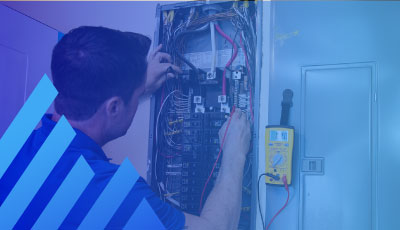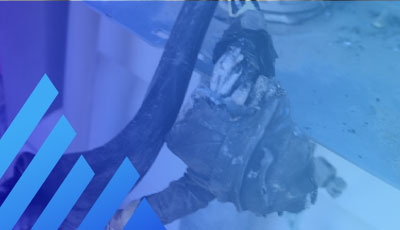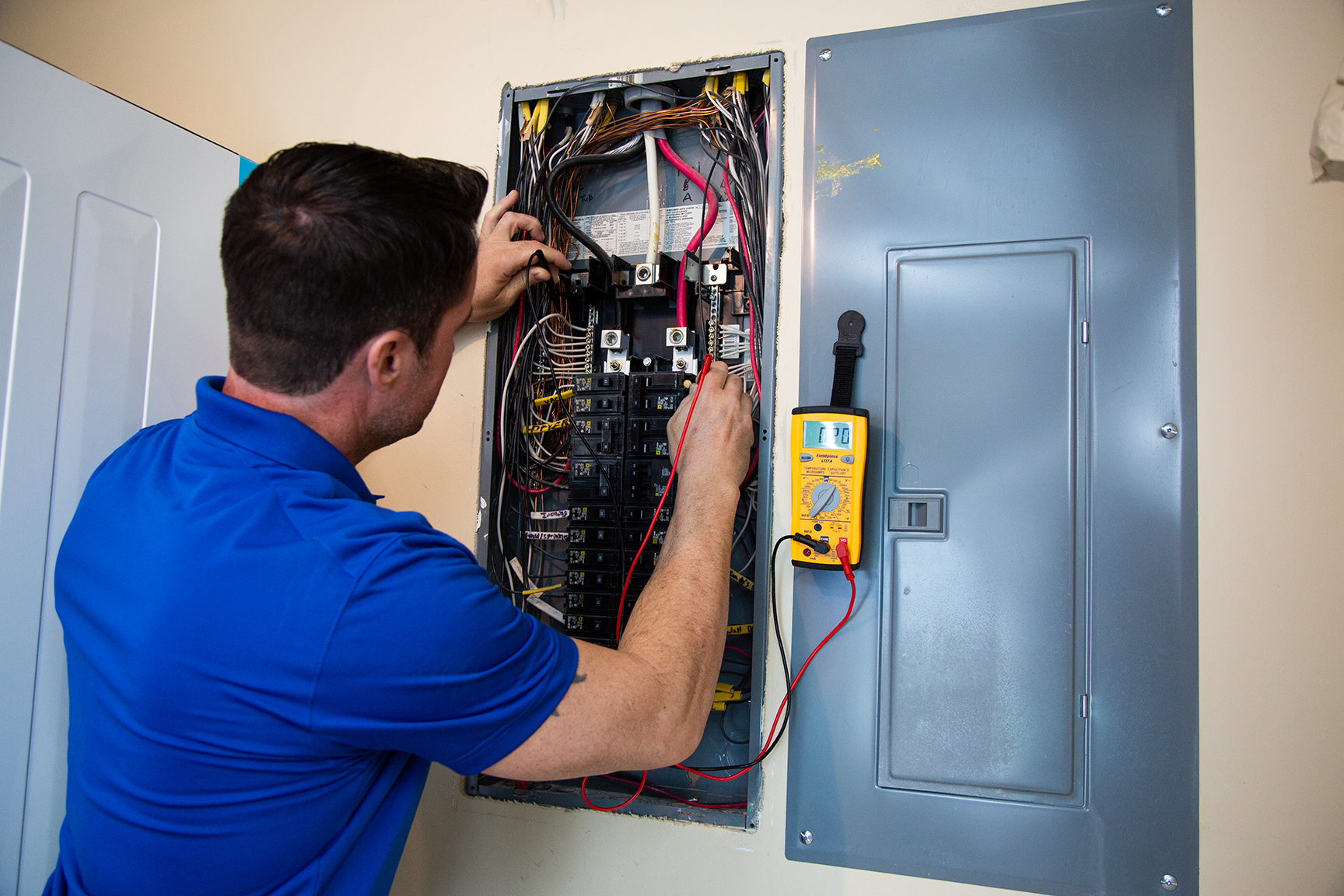Imagine your neighborhood experiences a power surge or power outage, despite the best efforts of utility companies. There may be some flickering lights or even sudden power loss. At the very least, you may need to get some candles and flashlights. Oftentimes, though, your home’s electricity supply can turn back on without complications.
However, a power surge also has the potential to cause severe damage to your electronics, home appliances, and other home devices. For example, let’s say that your power regenerates after a nearby lightning strike but when you try to switch on the TV, it doesn’t seem to work properly. Without the proper protection, this can happen to most of your home’s powered appliances, from something as small as a light switch to something as costly as an air conditioning unit.
Let’s take a look at what’s happening here and what you can do to protect your personal belongings.
What is a Power Surge
In this modern-day, it’s become essential for us to have an uninterrupted and safe supply of electricity to our homes. Recently, our experts have gone on multiple calls where power surges in Utah have taken out TVs, laptops, melted electrical wires, and fried the computer boards in furnaces and air conditioners.

A power surge, simply put, is an unexpected increase or surge of electrical voltage. This increase can be insignificant to your plugged-in devices or it can be detrimental, depending on the size of the surge. In a home, a power surge is characterized as one that is higher than the voltage of most wall outlets, which are typically at 120V in the US. This is the average voltage, but household appliances and electronics are typically 110 volts or 220 volts.
However, the true amount of voltage in a wall outlet constantly oscillates between a few volts up to 169 volts. It is only when that voltage passes 170 V that a potentially harmful power surge happens.
Signs of a Coming Power Surge
There are several signs to watch out for that may indicate a power surge is coming. Things to look out for include:
- Flickering, buzzing, or dimming lights
- Frayed wiring
- Discoloration or scorching of outlets or areas surrounding wires
- Smoke coming from outlets
- Warm or vibrating outlets
- A burning smell or odd, sharp odors near outlets
Indications Your Appliance or Device Experienced a Power Surge:
- The device’s clock or lights are flashing
- The device is off or does not work
- There is an acrid, burnt odor around the device or power source
- A surge protector or power strip may require resetting

Causes of a Power Surge
Power surges can result from many things, such as an electrical overload, power grid switching, issues with a transformer or transmission line, a return to connection after a power outage, lightning strike, faulty wiring—which is more likely the case with damaged or exposed electrical wires.
During an electrical overload, too much power is drawn from a single circuit. Such an overload can result from overusing extension cords and plugging in too many devices into the same circuit.
A more common cause for a power surge could be from your refrigerator or AC, as these require so much energy to switch on and off that the brief power demand disturbs the steady flow of electricity.
If there is faulty wiring behind the walls, it’ll be hard to find. So, aside from a power surge, we list some other signs of faulty wiring below:
- Outlets with burn marks.
- A burning smell comes from wiring or outlets.
- A buzzing sound coming from outlets.
- Circuit breakers frequently trip.
Potential Property Damages From Power Surges
A power surge, also known as a spike in voltage, can be extremely harmful to appliances and electrical devices in your home.
When the voltage increases above an appliance’s normal operating voltage, it can cause an arc of electrical current within the appliance, and the heat generated in the arc can severely damage it.
This excessive heat can melt electrical wiring, outlets and other points of connection, and computer boards.
There are also less intense but repeated power surges that can cause damage to your property. These smaller surges could be the reason your TV, alarm clock, or furnace suddenly stops working. They slowly cause damage, and while your computer or stereo may continue to function at a sufficient level, a recurring power surge significantly shortens the life span of appliances and electronics.
What to Do in Case of a Power Surge
The recommended course of action after a known power surge has occurred is to:
- Reset and unplug your electronic devices. Make sure this is done before resetting your circuit breakers if a power outage has occurred.
- Go through your home and check for damage to any of your appliances, electronics, and power outlets.
- Check your HVAC system for functionality; it will also need to be reset accordingly. If you notice anything wrong or need assistance, we recommend getting a professional opinion from Expert Services- Plumbing, Heating, Air & Electrical.
How Expert Services- Plumbing, Heating, Air & Electrical can Help You
In everything we do, our priority is to make sure you get the service you deserve. Our electricians are experienced, licensed professionals that have continuing education in order to maintain an active license and give you expert service, which includes helping you protect your home from the damage of power surges.
In determining who covers the costs of power surge damages, it depends on your home insurance plan and the reasons behind the surge. Unfortunately, if the surge that damaged your devices or home appliances was caused by known faulty wiring or overloading circuits — especially those with visible warning signs — there will be costly repairs to make when resolving an electrical issue. Our electricians are here to help you along the way.
Whole Home Surge Protection From Expert Services- Plumbing, Heating, Air & Electrical
At its worst, a power surge can carry tens of thousands of volts, which is enough to fry circuit boards, crash hard drives, and ruin home-entertainment systems.
There are a few options to consider when deciding on what kind of surge protection is best for your home. Let’s take, for example, plug-in-style surge protectors: the cost of buying multiple protectors for multiple appliances and outlets can quickly add up. Moreover, the most expensive items that are often damaged are rarely plugged into surge protectors like refrigerators, furnaces, AC units, TVs, etc.
We agree that plug-in surge protectors serve an important purpose, but the obvious limitation is that they only protect what is plugged into them and don’t offer protection to your entire home.
Comparatively, whole house surge suppressors, or panel-mounted surge suppressors, connect directly to your home’s electrical panel and prevent power surges from entering your home at the source. They work by diverting voltage spikes safely to the ground rather than letting them enter the sensitive circuits of your appliances or home equipment. By purchasing a quality surge protector, also called a surge suppressor or surge diverter, you can help protect your home and all your property from damage caused by power surges.
Expert Services- Plumbing, Heating, Air & Electrical’ licensed electricians install whole-home surge protectors that come with warranties against potential damages caused to property if they fail. Our highly recommended whole-home surge protectors give you peace of mind when it comes to safeguarding your appliances, electronics, and the wiring of your entire home.
We Can Help You Today!
Talk to one of our experts to find out the best protection for your home. You may need a higher joule rating for your surge protector, which means higher protection for more valued items. Your entire home and its belongings can stand to benefit from surge protection, but usually, alarm clocks and lights are not high on the priority list. Our trained Utah electricians take all this and more into consideration as we work to understand what’s most important to you.
Our experienced professionals offer expert services for all your plumbing, heating, air, and electrical needs! If you experience a power outage in Utah or want to prevent your home from the potential damage of one, we’re here to help. We can provide you with a customized electricity plan today at (801) 224-8118.
Sources:
https://www.directenergy.com/learning-center/what-is-power-surge
https://taraenergy.com/blog/power-surge-how-they-happen/#:~:text=What%20Is%20a%20Power%20Surge,on%20120%20volts%20on%20average
